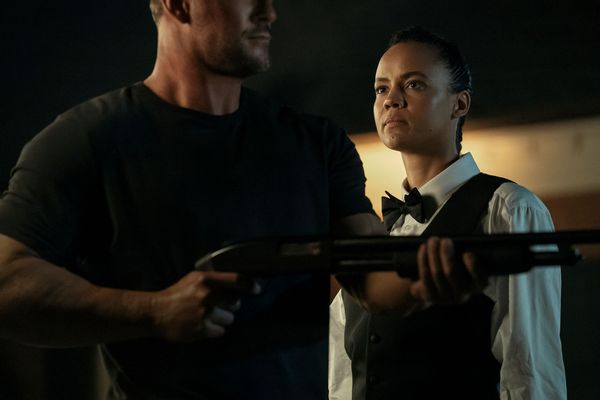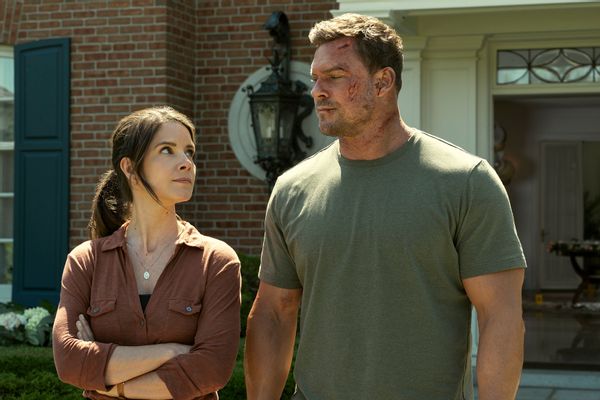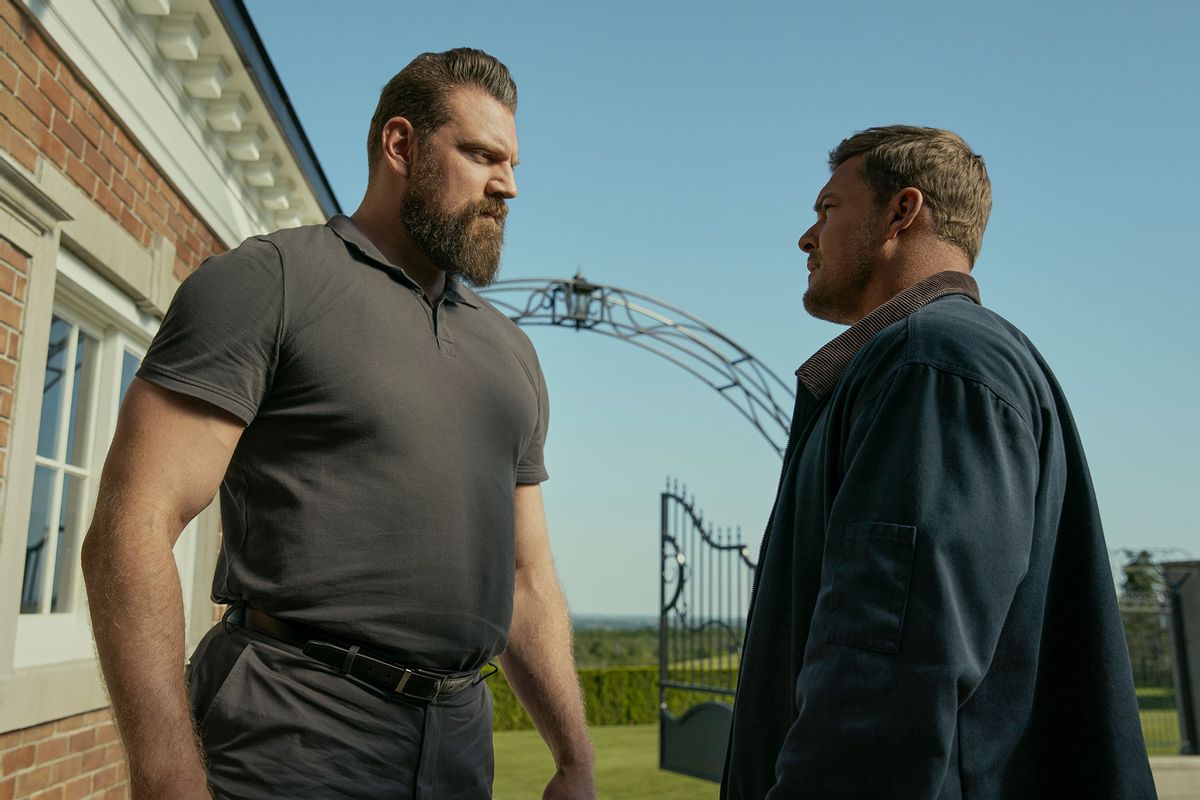It is simply too big, this foe – unexpectedly huge and surprisingly quick. Jack Reacher’s creator, Lee Child, designed his hero to strike this fear in his adversaries as they size up all six feet and five inches of him and realize he’s tougher and more strategic than they expect him to be. Maybe we can empathize with that powerlessness, what with rogue forces presently stomping systems meant to protect the vulnerable.
Jack Reacher, if he were real, wouldn’t be the villain in this scenario. A billionaire plays that part, whereas Reacher takes pride in moving through life with nothing but the clothes on his back and a toothbrush.
Reacher is both an overt right-wing power fantasy and the kind of avenger lefties can get behind.
But it’s satisfying to imagine that somewhere in the wilderness, a Goliath slayer is waiting for the right time to strike. In every season of “Reacher,” Alan Ritchson’s retired military investigator doesn’t gun for anyone who doesn’t deserve it.
So what happens when he’s the little guy going toe-to-toe with someone who is physically much larger? Does he stand a chance? Do we?
If cinematic violence is a language of escalation, “Reacher” is fluent and specific. There are many scenes in which Ritchson’s wandering knight succinctly spells out to some lunkhead he’s just broken how he broke them – that is, if they don’t die outright.
Although the stories change with each new season of “Reacher,” some pleasures are constant. Foremost among them is the assurance that’s he going to extralegally kill a lot of people who have it coming and not feel bad about one of them. Neither will we.
That’s because Reacher is an expert in what he does, a type frequently dismissed in this kakistocracy. In “Killing Floor,” Child’s 1997 debut and the inspiration for the first season, the author explains what differentiates Jack Reacher from, say, Dexter Morgan or another righteous vigilante. Reacher's quarry is former military or law enforcement turned evil, not simply murderers but “[extremely] well trained, at huge public expense. So the military policeman is trained even better. Better with weapons. Better unarmed.”
 Alan Ritchson (Jack Reacher) and Maria Sten (Frances Neagley) in "Reacher" (Jasper Savage/Prime)
Alan Ritchson (Jack Reacher) and Maria Sten (Frances Neagley) in "Reacher" (Jasper Savage/Prime)
Reacher, then, is both an overt right-wing power fantasy and the kind of avenger lefties can get behind. Consider his traits. He’s a man of his word and precise in his actions, usually the smartest guy in the room and always the quietest. He values skill, graciousness, and intellect and detests wanton corruption — especially when it touches him or someone he cares about. He only wears thrift store clothing and has no permanent address.
Somehow his charm shines through nevertheless, or maybe it’s Ritchson’s chiseled abs that do the talking. Either way, another season-to-season surety is the lead woman on Reacher’s side who isn’t his platonic and marvelously capable ride-or-die Neagley (Maria Sten), gets a roll in the hay with the guy regardless of how little chemistry they share.
But the bipartisan pull of “Reacher” primarily rests in the title character’s endless vendetta schedule. Vengeance drives our current politics and culture, but it has always been the TV adaptation’s North Star.
We need your help to stay independent
Season 1 placed Jack Reacher on the trail of the people who killed his brother and the entity that put them up to it. The second season was an ensemble affair, pulling together the remaining members of his hand-picked Special Investigations Unit to track down those who slaughtered their compatriots.
The latest “Reacher” adventure, based on Child’s “Persuader,” installs him inside the business of an anxious rug importer, Zachary Beck (Anthony Michael Hall), who may be hiding drugs in his carpet shipments. Beck is wanted by DEA agents Susan Duffy (Sonya Cassidy) and Guillermo Villanueva (Roberto Montesinos) who have a personal reason for placing Reacher on Beck's tail.
"Reacher" can be interpreted as a far-right fever dream of America—a land of gorgeous vistas and open roads, with a heartless criminal lurking at rest stops—or as a product of the same.
But their mission is secondary to the headlining confrontation set up in the third season premiere, placing another certainty in doubt: the assurance that Reacher wins every fight. From the moment our avenger lays his eyes on Beck’s massive gatekeeper Paulie (Olivier Richters), we understand his unstoppable force is on a collision course with an immovable object.
That also changes the story’s pacing. This season’s arc draws attention to Reacher’s ability to talk his way into a criminal organization and out of flaws in a plan that comes together at the last minute; as much as Duffy wants to nail Beck to the wall, there's someone Reacher is positively spoiling to annihilate.
 Sonya Cassidy (Susan Duffy) nd Alan Ritchson (Jack Reacher) in "Reacher" (Sophie Giraud/Prime)
Sonya Cassidy (Susan Duffy) nd Alan Ritchson (Jack Reacher) in "Reacher" (Sophie Giraud/Prime)
Where the first two seasons scheduled a brawl or a shootout in nearly every episode, this story challenges us to accept Reacher not as a raging bulldozer but as a stealth vehicle. Getting Reacher to his target takes patience on our part and a cool head on his, two ideas that don't always align with our desires. Fight sequences are fewer this time around, which makes the narrative progression feel sluggish at times, compared to previous rampages.
Compensating for all that is the regular reminder that a battle royale is brewing between the title character, played by a 6’3” actor, and a heavy portrayed by a bodybuilder known as the Dutch Giant, a 7-foot, 2-inch tower. Some of the best popcorn movie climaxes are built around less.
"Reacher" can be interpreted as a far-right fever dream of America—a land of gorgeous vistas and open roads, with a heartless criminal lurking at rest stops—or as a product of the same. Right now, distinguishing between the two can feel like a matter of degrees.
Last year, Ritchson stated his opposition to Donald Trump in a Hollywood Reporter profile, stunning the series’ MAGA viewership. Even so, in the way that all resonant art concretizes the reigning philosophy of the culture producing it, “Reacher” valorizes the perilous and very American notion that might equals right, and that the justice system doesn’t go far enough with its punishments. This cuts both ways.
Want a daily wrap-up of all the news and commentary Salon has to offer? Subscribe to our morning newsletter, Crash Course.
Those with political dominance are purging branches of the civil service, taking over national arts organizations, defunding entitlement programs and threatening corporations that defy their dictates.
Those who have far less but everything to lose must rely on their hands and will. In that respect, “Reacher” places the darkest impulses in full sunlight beside our brightest, speaking to the furious whisper within that wants those doing us wrong to pay dearly, but doubts honest justice is possible anymore.
That stifled voice might find comfort in watching Ritchson’s brawler get his bell rung and refuse to back down from the inevitable conflict that might break him. Someone worries that Reacher may be afraid at long last, but he denies it. This seemingly unconquerable mountain, he assures us, is just another problem he hasn’t solved yet.
The first three episodes of "Reacher" premiere Thursday, Feb. 20 on Prime Video. New episodes stream Thursdays.
Read more
about this topic



Shares